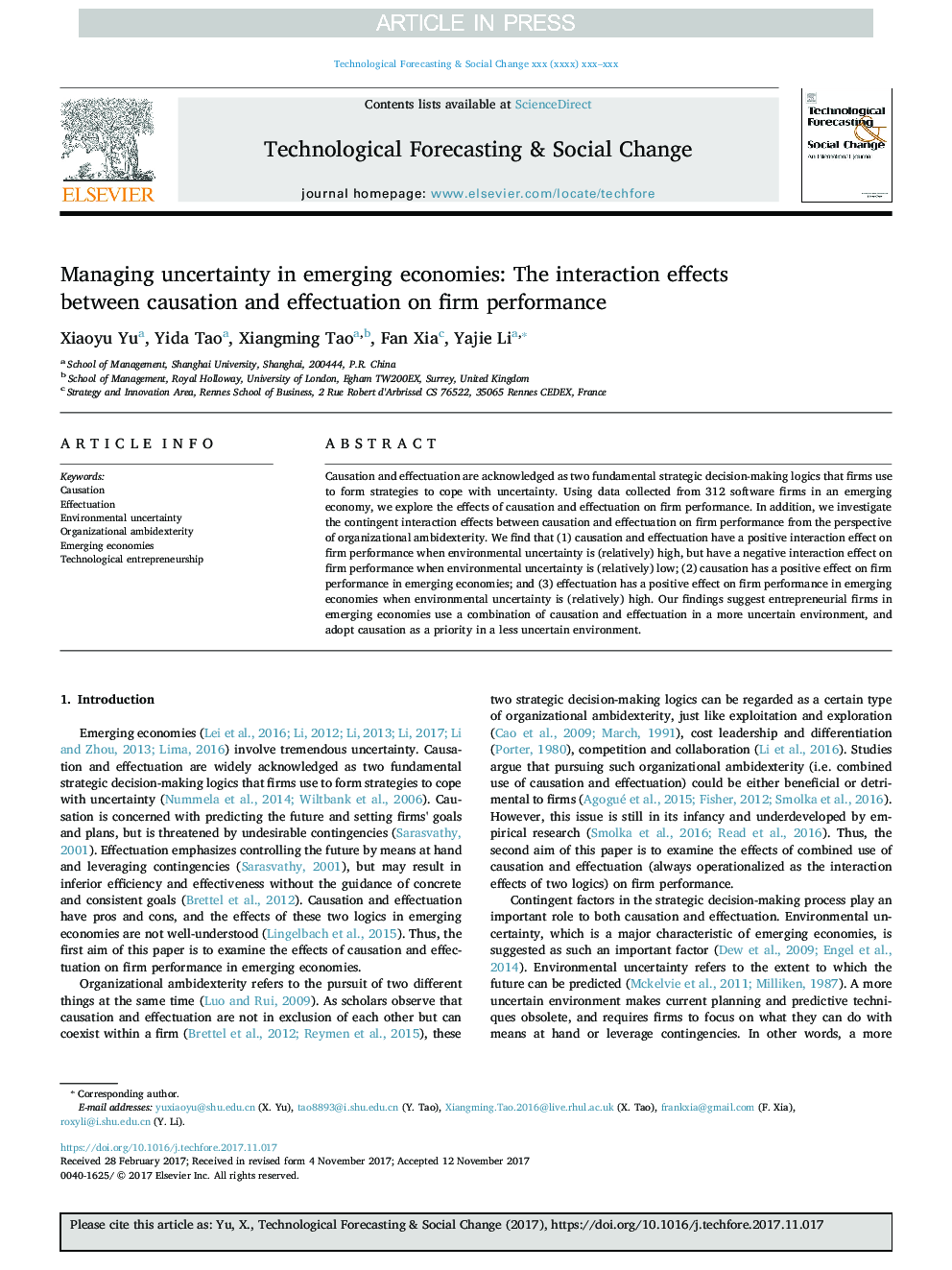| کد مقاله | کد نشریه | سال انتشار | مقاله انگلیسی | نسخه تمام متن |
|---|---|---|---|---|
| 9952892 | 1472366 | 2018 | 11 صفحه PDF | دانلود رایگان |
عنوان انگلیسی مقاله ISI
Managing uncertainty in emerging economies: The interaction effects between causation and effectuation on firm performance
ترجمه فارسی عنوان
مدیریت عدم قطعیت در اقتصادهای در حال ظهور: اثرات متقابل بین علیت و تحقق بر عملکرد شرکت
دانلود مقاله + سفارش ترجمه
دانلود مقاله ISI انگلیسی
رایگان برای ایرانیان
کلمات کلیدی
علت، اثربخشی، عدم اطمینان محیطی، تعادل سازمانی، اقتصادهای نوظهور، کارآفرینی تکنولوژیک،
ترجمه چکیده
علت و نتیجه گیری به عنوان دو منطق استراتژیک تصمیم گیری استراتژیک شناخته شده است که شرکت ها برای ایجاد استراتژی هایی برای مقابله با عدم قطعیت استفاده می کنند. با استفاده از داده های جمع آوری شده از 312 شرکت نرم افزاری در یک اقتصاد در حال ظهور، ما اثرات علیت و عملکرد بر عملکرد شرکت را بررسی می کنیم. علاوه بر این، ما بررسی اثرات تعامل احتمالی بین علیت و تحقق بر عملکرد شرکت از منظر ابهام سازمانی. ما نتیجه می گیریم که (1) علیت و تأثیر یک اثر متقابل مثبت بر عملکرد شرکت هنگامی که عدم اطمینان محیط زیست (نسبتا) بالا است، اما اثر متقابل منفی بر عملکرد شرکت زمانی که (عدم) قطعی محیط (نسبتا) کم است؛ (2) تأثیر مثبت بر عملکرد شرکت در اقتصادهای نوظهور؛ و (3) اثرگذاری اثر مثبت بر عملکرد شرکت در اقتصادهای در حال ظهور زمانی که عدم اطمینان محیطی (نسبتا) بالا است. یافته های ما نشان می دهد که شرکت های کارآفرینی در اقتصادهای در حال ظهور ترکیبی از علل و اثرات در یک محیط نامطمئن را استفاده می کنند و علیت را به عنوان یک اولویت در یک محیط نامطمئن کمتر می پذیرند.
موضوعات مرتبط
علوم انسانی و اجتماعی
مدیریت، کسب و کار و حسابداری
کسب و کار و مدیریت بین المللی
چکیده انگلیسی
Causation and effectuation are acknowledged as two fundamental strategic decision-making logics that firms use to form strategies to cope with uncertainty. Using data collected from 312 software firms in an emerging economy, we explore the effects of causation and effectuation on firm performance. In addition, we investigate the contingent interaction effects between causation and effectuation on firm performance from the perspective of organizational ambidexterity. We find that (1) causation and effectuation have a positive interaction effect on firm performance when environmental uncertainty is (relatively) high, but have a negative interaction effect on firm performance when environmental uncertainty is (relatively) low; (2) causation has a positive effect on firm performance in emerging economies; and (3) effectuation has a positive effect on firm performance in emerging economies when environmental uncertainty is (relatively) high. Our findings suggest entrepreneurial firms in emerging economies use a combination of causation and effectuation in a more uncertain environment, and adopt causation as a priority in a less uncertain environment.
ناشر
Database: Elsevier - ScienceDirect (ساینس دایرکت)
Journal: Technological Forecasting and Social Change - Volume 135, October 2018, Pages 121-131
Journal: Technological Forecasting and Social Change - Volume 135, October 2018, Pages 121-131
نویسندگان
Xiaoyu Yu, Yida Tao, Xiangming Tao, Fan Xia, Yajie Li,
